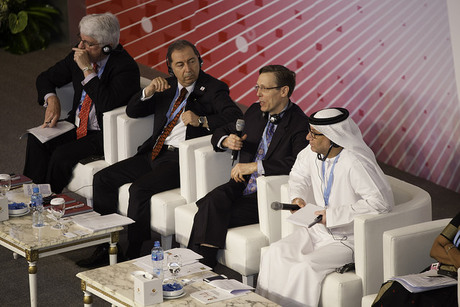Big data, spectrum crunch and network investment are hottest issues

Information and communication technology’s increasingly central role in almost every aspect of business and social interaction is creating enormous challenges for ICT regulators and policymakers, whose decisions will have a crucial influence on the shape of tomorrow’s world, top speakers told delegates to the International Telecommunication Union’s (ITU) Global Symposium for Regulators (GSR) last week.
The world’s largest annual gathering of ICT regulatory experts, GSR-14 was hosted by Bahrain’s Telecommunications Regulatory Authority under the patronage of Prime Minister HRH Prince Khalifa bin Salman Al Khalifa.
Chaired by TRA Chairman Dr Mohammed Alamer, over 700 leading specialists from 113 countries worldwide registered to attend the event, which grappled with the many complex legal and public-policy issues raised by our increasingly interconnected digital environment.
With the theme of ‘Capitalising on the potential of the digital world’, the event was one of the best-attended GSR events ever, attracting around 80 VVIPs and VIPs, including government ministers, heads of regulatory agencies and C-level industry executives.
It was officially opened on Tuesday 3 June by HRH Sheikh Ali bin Khalifa Al Khalifa, Deputy Premier of Bahrain, HE Sheikh Fawaz bin Mohamed bin Khalifa Al Khalifa, Minister of State for Telecommunications Affairs, and ITU Secretary-General Dr Hamadoun I Touré.
The conference heard how the fast-growing global store of huge data volumes generated by high-tech sensors, human interaction over web, email and social media sites, and machine-to-machine communications is creating a host of new business opportunities as well as concerns about privacy and the use of personal data by third parties.
Leading a session on big data, GSR Discussion Paper co-author Andrew Haire reminded delegates that 90% of the world’s data has been collected over the past two years.
With storage costs now low, the trend towards long-term storage of almost any kind of data - even information with no immediate obvious value - creates new potential for improving social services in areas like epidemiology, environmental management and disaster response, but also raises concerns about privacy protection and over-concentration of the data collection market into powerful monopolies.
Regulators need to be proactive about putting in place frameworks to harness the social benefits of big data while exercising foresight in protecting legitimate consumer concerns, the conference was told.
Consumer empowerment and the need to share resources were leitmotifs of this year’s event, as regulators stressed the social importance of affordable ICT access, and operators and service providers sought ways of enhancing competition and bringing new products to market in the most cost-effective ways possible.
The need for more radiofrequency spectrum to alleviate ‘spectrum crunch’ and support a growing array of wireless services was one issue where concepts around shared spectrum approaches stimulated vigorous debate, both during a pre-event workshop hosted by ITU’s Radiocommunication Bureau, and at a special session on spectrum licensing held on Wednesday 4 June.
During an animated discussion, several speakers and delegates stressed the importance of reliable spectrum allocations that deliver return on investment for ICT players and service quality for users, urging regulators to be open to evolution while ensuring the protection of existing services.
In a Network Debate session, experts from the policymaking sphere, the telco community and the satellite industry also emphasised sharing - this time, of infrastructure - as part of innovative strategies that can help the ICT industry grow networks in today’s largely privatised environment, where national governments - the builders of most of today’s existing fixed copper and fibre networks - no longer directly fund new network build out.
Panellists noted that shared approaches can help new players enter markets, stimulating competition and giving consumers great choice. They also emphasised that in a highly capital-intensive sector, good levels of return on investment are essential, as are clear and predictable regulatory frameworks that promote investor confidence.
For regulators, that means ICT frameworks need to be flexible enough to support innovation and new business models while ensuring current players still have the opportunity to develop and grow their operations, observed moderator Kamal Shehadi, Chief Regulatory Officer with leading Middle East operator Etisalat and Chairman of the GSR-09 event held in Lebanon, Beirut, in 2009.
The largest specialised gathering of ICT policymakers, the annual Global Symposium for Regulators was launched by ITU 15 years ago with the aim of stimulating debate, knowledge sharing and exchange of best practice among regulators, government policy analysts and other ICT stakeholders.
GSR ensures the voice of industry is brought in through the Global Regulators-Industry Dialogue (GRID), where private sector experts have the chance to debate key issues with their regulatory counterparts.
The event concluded with a set of regulatory Best Practice Guidelines, which emphasised the importance of flexibility and manoeuvrability for regulators, and of a holistic approach to today’s converged environment to take into account the needs of a broader digital ecosystem, rather than traditional service categories like ‘telecoms’ or ‘broadcasting’.
Outputs from the meeting will be incorporated into the next edition of ITU’s flagship regulatory report, Trends in Telecommunication Reform, which will be released in the coming months.
How AI agents will transform enterprise IT operations
Implementing AI agents requires careful consideration of where the technology fits, what risks it...
Who should take the lead in responsible AI?
The companies that treat responsible AI as a necessity today will be the ones defining the...
Why there's no efficient automation without integration
It's not enough for organisations to simply use AI: they must leverage it in a way that...




